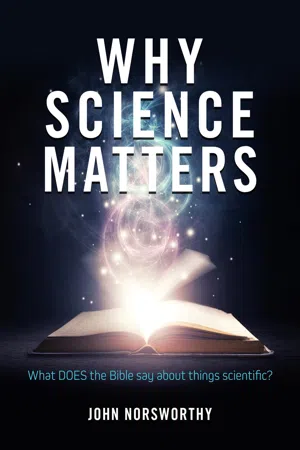3
References to Nature in the Bible: The Genesis Creation Story
Genesis 1 is the initial and hence the most significant reference to the cosmos in scripture. Therefore, it demands a chapter of its own.2
Background
The writer, Moses and the initial recipients, the people of Israel lived in a world uninformed by either the Bible or modern science. To understand this passage, we need to step into their world and their thinking. Resist the temptation to interpret it in the light of subsequent Christian and scientific thinking, until you have first got the intended meaning.
The cosmology and concept of gods and ideas about time spoken of earlier are particularly relevant. If God is going to reveal truth to these people about Himself in relation to the world, He is not going to confuse the message by arguing about their cosmology. That is why the text has ‘unscientific’ terminology that sounds like their ancient ideas about the shape of the cosmos.
The genre
The book of Genesis is historical narrative. This means it is the story of events reported by those who witnessed them. Research such as archaeology confirms it is accurate history. The very beginning of the book, the story of creation is an introduction to this history and by nature does not fit neatly into the genre of reported history. It is still totally reliable truth but not strictly ‘historical’ truth. It is ‘pre-historical’ truth.
Clearly the story is told in a patterned form. The repetition in the pattern is there to emphasize the truth being conveyed. We should give attention to the repeated expressions to see the main meaning.
The main message
At the risk of oversimplifying it, or of reading too much into text, here is what I see are the main points of what God is saying in it.
In the beginning…
Immediately the readers were confronted by a new idea. The world had a beginning. It has not always been there as they had assumed.
God created the heavens and the earth…
God, Elohim, is a plural word used as a singular word. It has the sense of the most holy ‘other’.
God exists and is a fellowship, the ultimate diversity in unity.
God is not part of the universe but pre-exists it. He is eternal. He created space and time and all that is in them. This confronts and contrasts dramatically with the ideas of deities these people would have held.
All that exists did not just happen. This answers the question, ‘Why is there something, rather than nothing?’
It was purposefully made! It has meaning! It is not a product of chance processes. It is not just a cosmic accident!
The earth was without form and void…
The word ‘was’ has the sense of ‘becoming’ and so could be rendered, ‘in the process of becoming it was’. If it was shapeless, ‘the earth’ may well mean, at this stage, ‘the matter that makes up the earth’, a legitimate use of the word ‘earth’.
Highlighting formlessness and emptiness is a hint that what is to come is describing two things, the shaping and the filling of the world.
There are various ideas on how this works out in the text. Some commentators suggest that days one, two and three are describing three aspects of forming and days four, five and six are describing three aspects of filling. Rather than one chronological sequence of six days, some suggest these are two sets of sequences.
The framework view suggests six ideas about creation expressing a logical rather than a chronological order:
| Forming: | Filling: | ||
| Day 1 | Light energy (and hence the form of matter) | Day 4 | Lights in the sky |
| Day 2 | Fluid matter: sky and sea | Day 5 | Creatures filling the sky and sea |
| Day 3 | Dry land masses and vegetation | Day 6 | Land creatures: animals and humans |
And darkness was over the face of the deep…
There was nothing to see yet. There was the absence of light. There was no input of what we call energy yet. This was to come from the ‘Spirit of God’ moving. Until this comes nothing can change and hence time is meaningless.
Then God said…
This is the first repeated phrase. It is the introduction to each day. It is the chief clue to the point of each day. We need to delve deeper.
Words were considered more than mere emissions of sound. They were powerful extensions of one’s being, communicating information and ideas.
This concept of God’s words, or Word is subsequently developed through the Bible. For example, Psalm 19 which is referred to in the next chapter. The second section of verses (9-11) uses five w...
